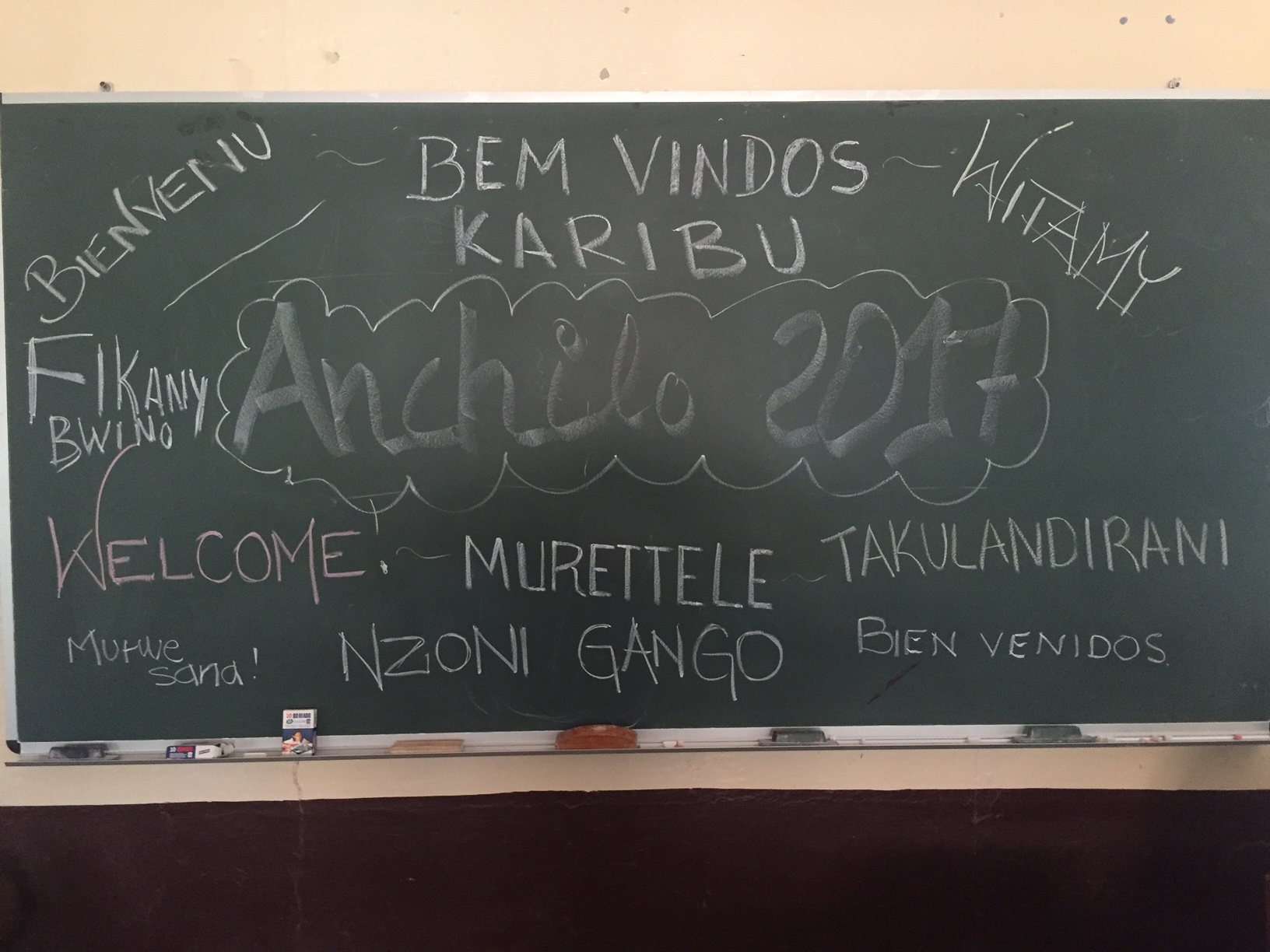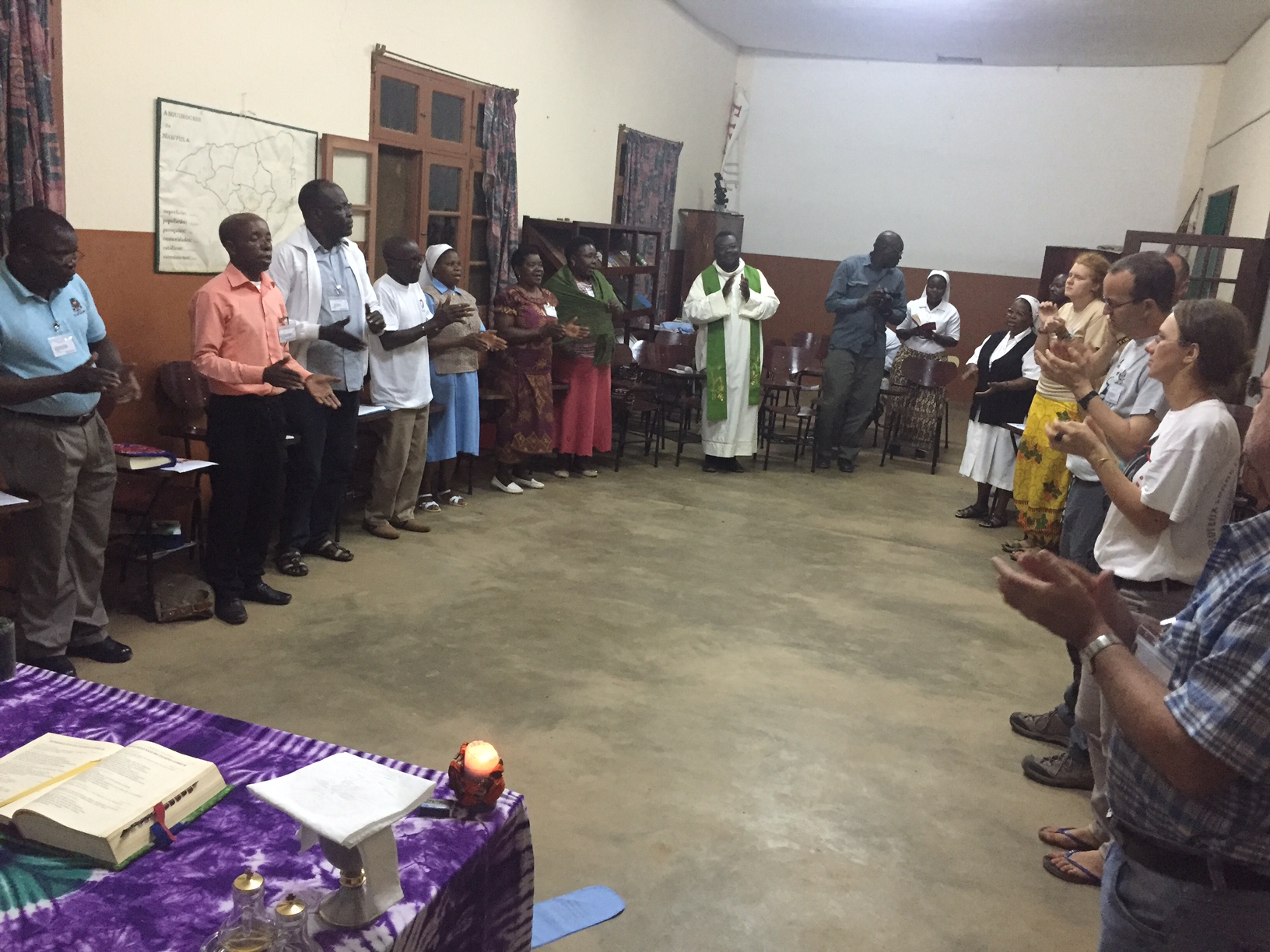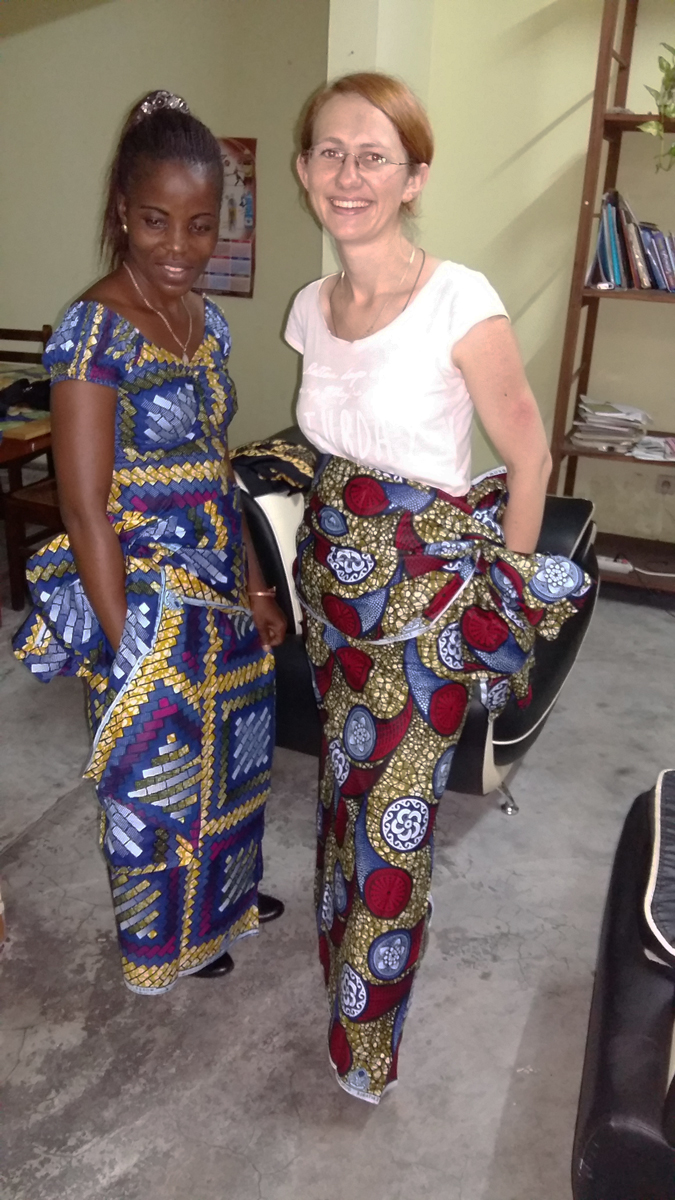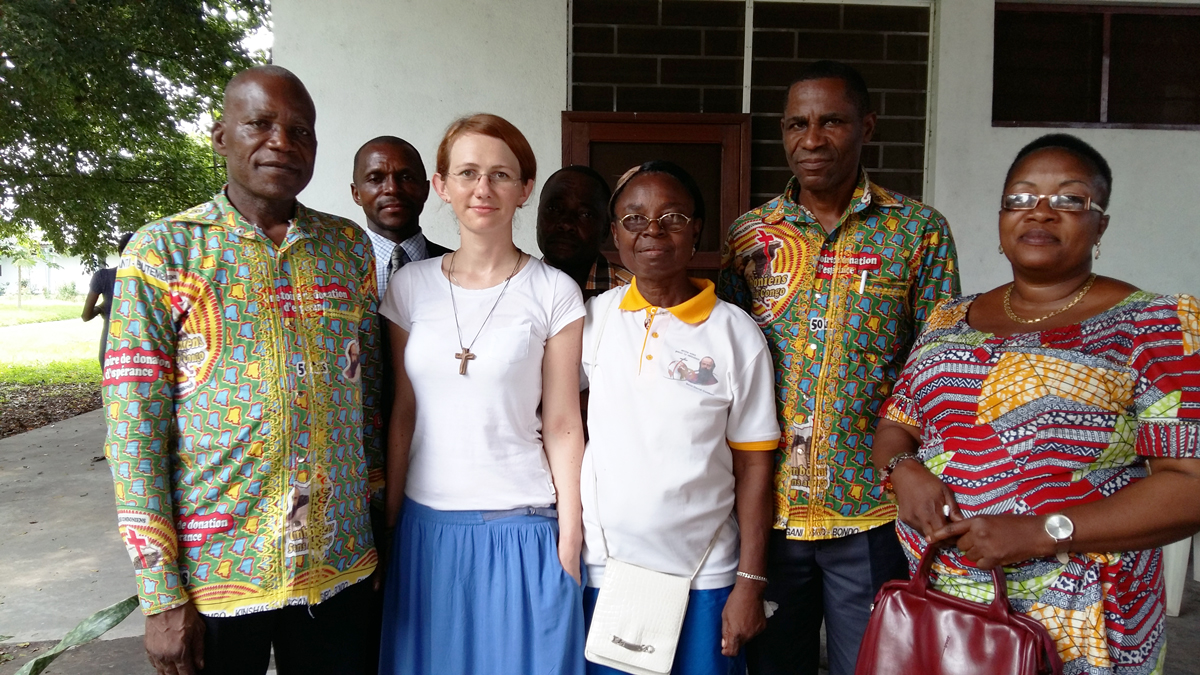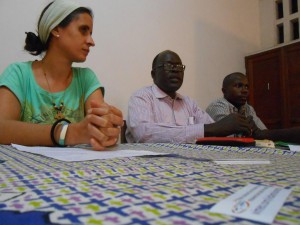 The coordinators of the Comboni Lay Missionaries (CLM) of the African Comboni Provinces, together with the Comboni Missionaries in charge of this sector, held their second African Assembly on July 21-26 at the Comboni residence of Kinshasa-Kimwenza, in the Democratic Republic of Congo (DRC). The gathering was called to reflect on the past and to plan future activities for the CLM in Africa.
The coordinators of the Comboni Lay Missionaries (CLM) of the African Comboni Provinces, together with the Comboni Missionaries in charge of this sector, held their second African Assembly on July 21-26 at the Comboni residence of Kinshasa-Kimwenza, in the Democratic Republic of Congo (DRC). The gathering was called to reflect on the past and to plan future activities for the CLM in Africa.
This second African Assembly of the CLM was attended by 25 people: 18 lay people, 5 Comboni Missionaries and two Comboni Sisters, including those in charge of the central commission of the CLM, Alberto de la Portilla and Fr. Arlindo Ferreira Pinto.
The morning of the first day was given to two informational sessions in order to introduce the participants to the program of the assembly. One session was on the current Congolese situation and the other dealt with the missionary vision of Evangelii Gaudium.
The assembly opened with the presentation of the participants, moderated by the lay members of the African Commission of the CLM:Dieudonné Likambo (Dido), Congolese, Innocent Mweteise Karabareme, Ugandan, and Márcia Costa, Portuguese working in Mozambique. Also part of this commission are the provincials Fr. José Luis Rodríguez López, of Mozambique,and Fr. Joseph Mumbere Musanga, of Congo. Fr. José Luis is in Mexico and Fr. Joseph only attended the last few days of the assembly, due to personal commitments.
Following the introduction, tasks for the week were distributed.
Márcia Costa then recalled the principal objectives of the assembly: to deepen the topics of identity, formation and financial self-sufficiency; to review and plan the activities of the CLM at the continental level and in the individual provinces, keeping in mind the conclusions of the intercontinental assemblies of the CLM, especially the last one, held in Maia, Portugal, in December 2012 and the first African Assembly, held in Layibi, Uganda in 2011.
Words of welcome were given through a message of Fr. Joseph Mumbere Musanga (read by Fr. Enrique Bayo Mata) and by Sr. Espérance Mamiriyo Togyayo, provincial superiors of the Comboni family in Congo. Both of them stressed the value of cooperation between the two Institutes born of the same Comboni charism and the importance of prayer joined to missionary witness as a Comboni family.
Fr. Arlindo Pinto, coordinator of the CLM at the general level, brought the greetings of Fr. Enrique Sánchez, superior general, and of Fr. Antonio Villarino, assistant general, who follow closely the varieties of expressions of the CLM on the African continent. From his part, Alberto de la Portilla, member and coordinator of the central commission of the CLM, said that this assembly is an event of interest not only for the African CLM, but also to those of the European and American continents, who share a strong feeling of belonging with the CLM.
Fr. Jean Claude Kobo Badianga, a Congolese Comboni Missionary, presented a brief history of the DRC in order to help us better understand the socio-political and economic situation, drawing comparisons with the history and past and recent conflicts of neighboring countries (Angola, Congo Brazzaville, Rwanda, Burundi, Uganda, South Sudan and the Central African Republic). He spoke of the main obstacles to a stable and truly democratic governability of the DRC, such as tribalism, regionalism and corruption. He referred to the various armed rebel groups active especially in the North and North-East of the country and the national political complicity with international interests tied to the very rich natural resources of the Congolese underground. Oil, gold, coltan and many other precious mineral resources are at the basis of all the social contradictions, economic inequality and armed conflicts in the DRC.
The Catholic Church and hundreds of other churches and sects take different positions on the situation faced by the country, mostly in order to favor the status quo and only rarely in order to denounce the injustices that victimize the Congolese population from North to South of the country.
F. Jean Claude pointed out that, in this social reality in the DRC and other African countries, the CLM have a moral and Christian responsibility that must be present in their pastoral and professional activities.
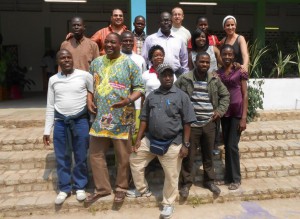 Fr. Enrique Bayo Mata, a Spanish Comboni Missionary working in the DRC, presented the topic of mission based on the apostolic exhortation “Evangelii Gaudium” of Pope Francis. Following a general introduction to the document, Fr. Enrique stressed the vision of a new evangelization marked by the joy of the announcing and of witnessing to the Gospel of Jesus Christ in the many human peripheries of today’s world. He spoke of the urgency of a pastoral conversion in order to move the Church to come out of itself in order to become missionary, which means to place itself at the service of persons and peoples, especially the marginalized, those who have a greater need of this joy, of faith and of Christian life and those who re farther away from the values of the Gospel.
Fr. Enrique Bayo Mata, a Spanish Comboni Missionary working in the DRC, presented the topic of mission based on the apostolic exhortation “Evangelii Gaudium” of Pope Francis. Following a general introduction to the document, Fr. Enrique stressed the vision of a new evangelization marked by the joy of the announcing and of witnessing to the Gospel of Jesus Christ in the many human peripheries of today’s world. He spoke of the urgency of a pastoral conversion in order to move the Church to come out of itself in order to become missionary, which means to place itself at the service of persons and peoples, especially the marginalized, those who have a greater need of this joy, of faith and of Christian life and those who re farther away from the values of the Gospel.
He added that lay people, intellectually and professionally formed, have a particular role in the pastoral process of evangelization, which aims at the transformation of society and at the inclusion of the poor in the active life of their country.
In the afternoon of the first day, Innocent gave a panoramic view of the CLM, mentioning that one always begins with small things in a restricted situation, by then growing and maturing if there is a clear vision of identity, of who we are, and if there is a concrete plan of action, of what we need to do, in a permanent context of listening to the Word of God, of prayer and vocational discernment, in the spirit of St. Daniel Comboni. Innocent’s presentation was followed by a long sharing section of ideas and experiences from various CLM situations in Africa.
In turn, Márcia Costa presented a summary of the first African Assembly held at Layibi, especially concerning the identity and the mission of the CLM. She pointed out that it is part of their vocation to get out of one’s own reality or country for a determined amount of time in order to get involved in missionary activity, and this is a life-long commitment.
The second day was given to the presentation of reports on the activities of the African commission, the central commission and the individual African provinces present at the meeting: Egypt-Sudan, South Sudan, Togo-Ghana-Benin, CAR, Congo, Mozambique and Uganda. Dido Licambo gave the presentation on the work done by the African commission since the gathering at Layibi up to the preparation of the present one in Kinshasa. Lberto instead presented the reports of the central commission and of the provinces that were not present, but that have CLM in their midst (Chad, Malawi-Zambia, Ethiopia).
One of the major problems that were discussed was the lack of communication between the African commission and the African provinces. This is due, in part, to difficulties arising from the different languages spoken in the provinces and the difficulty in accessing new technologies of communication, especially the Internet, in the vast majority of African countries.
On July 23 and 24 the conclusions of the assembly were reach through group discussions followed by plenary meetings, in order to be ready to answer the following questions: What is the relationship between the local CLM and the CLM from abroad working in your country? What challenges and strategies must we keep in mind in order to walk together? How can we share the contents of formation in different countries in order to have a similar basic formation across the continent? What is still lacking for us to be living our CLM vocation according to the conclusions reached at Layibi? What strategies must we adopt in order to live fully our CLM vocation? What strategies must we adopt in order to achieve self-sufficiency? How can we organize the CLM movement at all levels: formation, relations between CLM of different African provinces, vocation, organization and economy?
In the afternoon of July 24 and the morning of July 25, the lay people met on their own to prepare the conclusions, while the Comboni personnel met to examine their cooperation with the CLM and to share some ideas and experiences on how to help them and strengthen them in all the provinces.
Mention was made that this commitment was taken up by the Comboni Missionaries at the General Chapter of 2009.
On the last working afternoon, the conclusions were read, discussed and voted upon. The elections of the African commission followed: Dieudonné (Congo), Innocent (Uganda) and Márcia (Mozambique) were re-elected for another three years.
Finally, it was suggested that the next meeting take place at Lomé, Togo in July 2017. Place and date will need to be confirmed by provincial superiors of this sector.
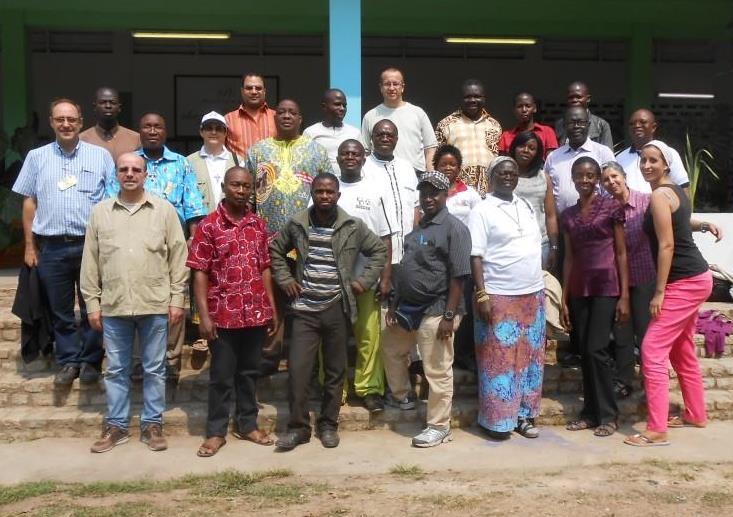
On Saturday, the group visited the botanical garden of Kisantu-bas Congo and the cathedral of Kisantu, about 75 miles from Kinshasa.
The assembly closed on Sunday with a meeting with the Congolese CLM of Kinshasa which took place in the provincial house of Kinshasa-Kingabwa. A Mass was celebrated with Fr. Joseph Mumbere presiding, and it was followed by lunch.
Arlindo Ferreira Pinto.




